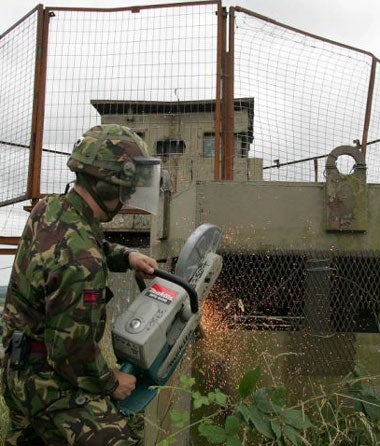Unionists call Army cuts 'appeasement of IRA'

Your support helps us to tell the story
From reproductive rights to climate change to Big Tech, The Independent is on the ground when the story is developing. Whether it's investigating the financials of Elon Musk's pro-Trump PAC or producing our latest documentary, 'The A Word', which shines a light on the American women fighting for reproductive rights, we know how important it is to parse out the facts from the messaging.
At such a critical moment in US history, we need reporters on the ground. Your donation allows us to keep sending journalists to speak to both sides of the story.
The Independent is trusted by Americans across the entire political spectrum. And unlike many other quality news outlets, we choose not to lock Americans out of our reporting and analysis with paywalls. We believe quality journalism should be available to everyone, paid for by those who can afford it.
Your support makes all the difference.Last week, the IRA announced it would decommission its weapons and end all illegal activities. Many reacted at the time with a general welcome but cautioned that they wanted actions rather than words.
But the far-reaching security package means the first actions are coming from the authorities rather than republicans, who welcomed yesterday's plan.
The package lays out a plan for the beginning of the end of the role of the Army. Troops were first sent on to the streets of Belfast and Londonderry exactly 36 years ago, in August 1969.
The overall plan is for more civilian policing with the Army's already much-reduced role being run down even further and the closure of many military bases. Anti-terrorist legislation is also scheduled to be appealed.
The Royal Irish Regiment (RIR) is to lose its three Northern Ireland battalions in the next two years. Those locally recruited units contain more than 3,000 soldiers, full-time and part-time.
Since its soldiers are predominantly Protestant, the scheme has unwelcome political and economic implications for the Unionist community. Unionist spokesmen regularly oppose the security run-down which has been under way during the past decade.
The Army began dismantling a watchtower last week, the day after the IRA declaration. It was known that news of further security relaxation was to be given this week but the ending of the RIR's role caused much surprise. The Democratic Unionist Party's leader, the Rev Ian Paisley, denounced yesterday's announcement as "a surrender to the IRA and further evidence of bad faith on the part of the Government".
He added: "We are appalled at the dishonest and dangerous approach." Mr Paisley said the Government "will pay a high price for its approach," warning that it would delay the return of devolution.
The Ulster Unionist Party leader, Sir Reg Empey, described the move as "deplorable, reckless and premature".
But Colonel Tim Collins, who had a high profile as a Royal Irish Regiment commander in Iraq, said of its members: "They can take great pride that their mission is accomplished at this point. There is no shame in them standing down."
The RIR's regimental colonel, Mark Campbell, said its members were people "who stood in harm's way in some very dark times". He added: "It is partly due to their sacrifice and effort that those who would use violence against the democratic process have now rejected violence."
Conor Murphy, a Sinn Fein MP, said: "I welcomed the start that the British Government made last week to the demilitarisation process and today's moves advance that process further. I now want to see the job completed as quickly as possible."
Peter Hain, the Northern Ireland Secretary, said the two-year demilitarisation plan would be contingent on the security situation. He added that he was moving quickly after the IRA's statement.
He said the aim was the creation of an environment which will allow the return of conventional policing across Northern Ireland.
Within the next eight months, the authorities plan to dismantle installations in South Armagh, Londonderry and Belfast, including an observation tower which has for decades been perched on top of high-rise flats at Divis in west Belfast.
If all goes well, a number of police stations are expected to close, as many have already done.
The security forces will meanwhile also "defortify" two dozen stations, opening police shops, increasing the bicycle patrols which have been introduced over the past year, and sending out single officers on patrol.
In most places, police continue to patrol in pairs, while they operate in a range of vehicles which include both conventional cars and heavily-armed Land Rovers.
Eventually, Northern Ireland will have a peacetime garrison of no more than 5,000 armed forces personnel, who will be available for worldwide operations.
The chief constable, Sir Hugh Orde, who approved the military plan, said that the IRA's statement was clearer than anything the organisation had issued before, but said that the actions of the organisation "will be crucial".
Security force numbers
* 1970: 3,500 police, plus several thousand troops in the garrison known as "Sleepy Valley".
* 1972: 21,000 troops, the high point, to mop up no-go areas in Operation Motorman
* 1982: 10,500 troops, 8,000 police
* 2005: 10,500 troops, 8,900 police
* By 2007: 5,000 troops, 8,900 police
Join our commenting forum
Join thought-provoking conversations, follow other Independent readers and see their replies
Comments